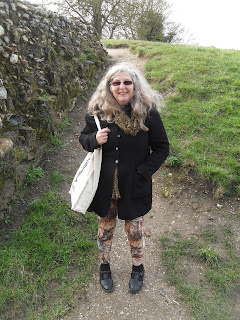Ruth Rikowski
@ Framlingham Castle, Essex
ADDITIONS TO ACADEMIA
POSTS:
OCTOBER 2016 – RUTH RIKOWSKI
Ruth Rikowski has
posted some new papers to Academia
These are as follows:
Rikowski, Ruth (2001) GATS:
private affluence and public squalor? Implications for libraries and
information, Managing Information,
Vol.8 No.10, December, pp.8-10, online at: http://www.academia.edu/27814491/GATS_private_affluence_and_public_squalor_Implications_for_libraries_and_information
Rikowski, R. (2002) The Corporate Takeover of Libraries, Information for Social Change, No.14,
winter 2001/02, online at: http://www.academia.edu/27807996/The_Corporate_Takeover_of_Libraries
Rikowski, R. (2002) The
WTO/GATS Agenda for Libraries, Talk prepared for a public meeting at Sussex
University, 23rd May 2002, online at: http://www.academia.edu/27815712/The_WTO_GATS_Agenda_for_Libraries_Talk_prepared_for_public_meeting_at_SUSSEX_UNIVERSITY
Rikowski, R. (2002) A First-Time in Glasgow: impressions of
the IFLA Conference, 2002, IFLA Journal,
Vol.28 Nos.5/6, pp.278-280, online at:
Rikowski, R. (2003) Globalisation
and Libraries – House of Lords Paper, in: Report by House of Lords, Select
Committee on Economic Affairs, Session 2002-03, 1st Report, Volume
of Evidence, Part 2, HL Paper 5-11, London: The Stationary Office, online at: http://www.academia.edu/27807221/Globalisation_and_Libraries_House_of_Lords_Paper
Rikowski, R. (2003) The Significance of WTO Agreements for
the Library and Information World, Managing
Information, January / February, Vol.16 No.1, p.43, online at: http://www.academia.edu/27814793/The_Significance_of_WTO_Agreements_for_the_Library_and_Information_Profession
Rikowski, R. (2003) Tripping Along With TRIPS? The World
Trade Organization’s agreement on Trade-Related Aspects of Intellectual
Property Rights (TRIPS) and its implications for the library and information
world, Managing Information, Vol.10
No.3, April, pp10-12, online at: http://www.academia.edu/27814936/Tripping_Along_with_TRIPS_The_World_Trade_Organizations_agreement_on_Trade-Related_Aspects_of_Intellectual_Property_Rights_TRIPS_and_its_implications_for_the_library_and_information_world
Rikowski, R. (2003) The Role of the Information Professional
in Knowledge Management: The Beginning of the End or the End of the Beginning
for the Library and Information Profession? Managing
Information, Vol.10 No.4, pp.44-47, online at: http://www.academia.edu/27814711/The_Role_of_the_Information_Professional_in_Knowledge_Management_The_Beginning_of_the_End_or_the_End_of_the_Beginning_for_the_Library_and_Information_Profession
Rikowski, R. (2004) Creating Value from Knowledge in the
Knowledge Revolution, Information for
Social Change, No.20, winter 2004, online at: http://www.academia.edu/27807687/Creating_Value_from_Knowledge_in_the_Knowledge_Revolution
Rikowski, R. (2008) Digital Libraries and Digitalisation: an
overview and critique, Policy Futures in
Education, Vol.6 No.1, pp.5-21, online at: http://www.academia.edu/27815559/Digital_Libraries_and_Digitisation_an_overview_and_critique
Rikowski, R. (2008) Computers / Information and
Communications Technology, the Information Profession and the Gender Divide:
Where are we going? Policy Futures in
Education, Vol.6 No.4, pp.482-506, online at: http://www.academia.edu/27815632/Computers_Information_and_Communications_Technology_the_Information_Profession_and_the_Gender_Divide_where_are_we_going
For all of Ruth
Rikowski’s papers at Academia, see: http://lsbu.academia.edu/RuthRikowski
For all of Glenn
Rikowski’s papers at Academia, see: http://independent.academia.edu/GlennRikowski














